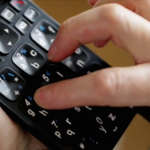 Smartphones have been undoubtedly incredible inventions, with the millions of apps opening up a cornucopia of innovation on a scale never previously seen.
Smartphones have been undoubtedly incredible inventions, with the millions of apps opening up a cornucopia of innovation on a scale never previously seen.
As a reasonably able person however, I still struggle at times to operate the things correctly, especially if fine movements are required. The issue is undoubtedly more pronounced for the elderly who may lack even my fumbling motor skills.
A smarter smartphone
A recent invention aims to make the smartphone more accessible to older and disabled users. It sees a smartphone equipped with both physical buttons but also an app that offers emergency help.
The buttons are designed with a concave shape that aims to make it easier for users to press them, even with unsteady hands. The emergency function, meanwhile, offers users a one touch way of sending a text message complete with GPS information to the users next of kin. If no response is received from that person, an emergency call is issued automatically.
As with so many innovations, the product was born out of frustrations felt in the personal life of the inventor, whose mother struggled to effectively use Skype.
The Ezismart
The product, known as Ezismart, has spent a significant spell in gestation, but a prototype is finally ready to hit the market.
“Of course I was excited to see if the product would be accepted by potential users”, the inventor says. “So when I got to know a man who has Parkinson’s syndrome, and who suffers from intense shaking and stiffness, I let him have a go with the case. After only two minutes he could call and compose messages – something which previously had been impossible for him with the touch screen.”
The Norweigan innovation company SINTEF were recruited to help commercialize the invention.
“This was an idea that grabbed our attention at once”, says researcher and Project Manager Hanne Opsahl Austad at SINTEF ICT. “We all know that smartphones make communication with the outside world very easy, and that this enhances our quality of life. This is especially true for people who can’t get out as much as others. So the EziSmart idea is what we call welfare technology”, she says.
The partnership saw funding secured that has enabled the device to be put through more thorough user testing amongst elderly people. Eventually, it’s hoped that the device will help elderly users retain their independence and live at home as long as possible.
This will be followed by a fundraising campaign on Kickstarter to enable further development to be undertaken as a result of the feedback from the user testing, with an eventual aim to launch the product in around a years time.
Great innovation sir, i love it.. Thank you for sharing